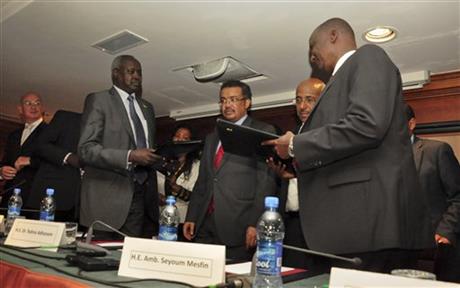
By ILYA GRIDNEFF
Nhail Deng Nhail, 2nd left, the head of South Sudan’s negotiating team, and top negotiator for the rebel’s side, Taban Deng Gai, right, a general in South Sudan’s army before he defected, sign a cessation of hostilities agreement in front of mediator Ethiopian Foreign Minister Tedros Adhanom, center, in Addis Ababa, Ethiopia Thursday, Jan. 23, 2014. South Sudan’s government and rebels fighting against it have signed Thursday a cessation of hostilities agreement in Addis Ababa that should at the least put a pause to five weeks of warfare that has claimed thousands of lives and uprooted a half million people since fighting began Dec. 15 between the government and supporters of former Vice President Riek Machar. (AP Photo/Elias Asmare)
JUBA, South Sudan (AP) — In a sign a new peace deal may not hold, South Sudan’s government and rebels accused each other of attacks Saturday that come after the cease-fire was supposed to take hold.
If the attacks continue, government troops will defend themselves, said Information Minister Michel Makeur Lueth. The peace deal was signed Thursday night but did not go into effect for 24 hours, said Lueth.
Rebel spokesman Lul Ruai Koang countered “It is government forces who are breaking the cease-fire, not us. … they attacked our positions and immediately accused us of breaching the cease-fire.
The minister would not say where the fighting was taking place on Saturday. Koang said they were attacked in Unity and Jonglei states “and we fought back in self-defense.”
Government leaders had expressed fear that fighters in Jonglei known as the White Army would not abide by the deal.
“These are rebels and they are undisciplined people and not a regular force and have no central command, and for that matter it is not strange that they immediately violated it,” Lueth said.
Still, he said the peace deal “was not a waste of time,” adding, “We will try our level best to ensure the cessation of hostilities is properly effected and monitored.”
The conflict between government forces and rebels loyal to former Vice President Riek Machar has forced 500,000 people from their homes and killed thousands since hostilities broke out Dec. 15.
Meanwhile, a U.S. based conflict prevention group, the Satellite Sentinel Project, said new satellite images of South Sudan show that fighting resulted in the intentional burning of some 750 homes near the town of Bentiu, the capital of oil-producing Unity state.
“These scorched-earth tactics have destroyed homes and residential areas, and put women, children, and families in great danger,” said Akshaya Kumar, the South Sudan analyst for the U.S. based Enough Project.
Bentiu has changed hands twice “with several rounds of bitter, protracted battles inflicting heavy damage,” it said.
The U.N. says both sides have committed gross violations of human rights during the conflict, in which entire army battalions defected to the rebels made up of mainly Nuer fighters loyal to Machar. Government troops are mainly from the president’s Dinka tribe.


